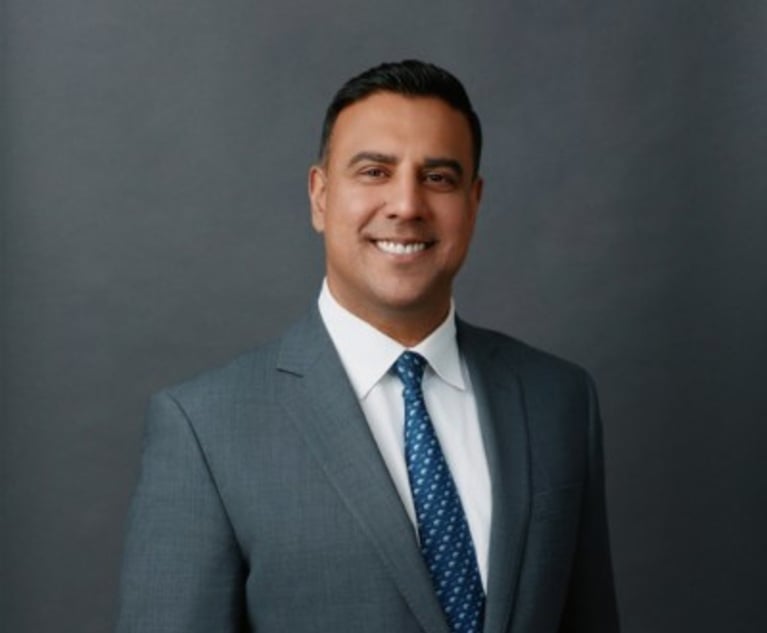The Burberry Bar – how the Bar should market itself
Legal Week's editor in chief Alex Novarese argues that the Bar should ditch the dogma and focus on its past to reposition chambers as tightly focused providers of top-quality legal services...
November 15, 2012 at 07:03 PM
6 minute read
Legal Week's editor in chief Alex Novarese argues that the Bar should ditch the dogma and focus on its past to reposition chambers as tightly focused providers of top-quality legal services
A lot of the debate around how the Bar should market its services comes down to fusion – or rather the painful ambiguity regarding fusion. I cannot foresee any long-term reading of the legal industry in which we won't see the Bar evolve towards something that looks more like a law firm, or at least legal service entities. Pretty much all the forces are pushing in that direction, whether it is regulation, the Legal Services Act or the expansion of direct access.
That's all fine. The Bar will compete – and survive – on what it has traditionally competed on. That is by being:
(a) advocacy specialists, which most solicitors don't want to do; and
(b) better than solicitors, because the Bar gets the brightest students.
I fail to see what either (a) or (b) have got to do with necessarily structuring yourself as something called a chambers, in which barristers class themselves as 'self-employed'. Now if you assume that chambers will evolve to have a stronger structure backing them, that leaves the question of how barristers market themselves. Once you move away from an institutional referral model, marketing becomes more important.
But there is nothing to fear here. While chambers can't get anywhere near matching the resources of law firms, they can achieve a lot by being more focused and having better and more accountable commercial staff. When chambers market themselves, as for example with 5RB's popular media event or Monckton Chambers' successful direct access pitch, they generally do a good job.
Barristers are also largely good with journalists when they bother to interact with them.
In this regard, they have an inbuilt advantage over their more numerous solicitor cousins. The media's pronounced bias towards covering litigation and the courts over other areas of legal policy – while not always logical – allows senior barristers to have a far higher profile than prominent solicitors.
The sad truth about newspapers is that they often cover what is convenient and known to them. Make yourself available, become a pundit and the calls will keep coming. The media profile of canny operators like John Cooper QC proves my point – but George Carman and even barristers of the pre-war era had already shown what you could do with a catchy soundbite, reasonable availability and a willingness to socialise with journalists.
Online voices
Turning from traditional media to social media, the Bar clearly already punches well above its weight compared to law firms. Social media, blogging and online publishing thrive on the kind of informed individualism that is the Bar's stock in trade.
As such, online resources such as 1 Crown Office Row's well-read and authoritative UK Human Rights Blog has become a how-to guide for chambers – and has provided a huge profile boost to the set.
There are other voices that have emerged online, such as Felicity Gerry, Francis FitzGibbon QC and the aforementioned John Cooper, in a way that solicitors' firms – which are hamstrung by trying to feed such efforts through their corporate branding machines – have struggled to match.
Perhaps more importantly, the clerking model looks to be a template for how the Bar can compete against the armies of business development staff that law firms have amassed.
The Bar hasn't always recognised this opportunity to profit from the inertia that is the Achilles heel of large legal firms. There was the case 15 years ago to refashion the old clerking model as a more fully fledged commercial hub. Instead, some chambers tried to replace it, and frankly played cheap when it came to properly rewarding non-barrister staff who were contributing to their financial success. That will not do in the long run. Barristers don't need to have armies of non-lawyer staff – but they will probably need to have a select band of very able and well-paid ones.
In the future, it is easy to imagine barristers becoming high quality, commercially minded and highly responsive legal service providers – like tightly run boutiques compared to the retail empires of law firms. The stock in trade is quality delivered with style and responsiveness, not colourful eccentricity and nostalgia.
Chambers should also accept the need to invest more of their revenues in well-targeted infrastructure. Not a huge amount, but a little more than they do now. Provided it contributes to the growth and profitability of chambers, who cares if you spend 25% of income on dues or 30%?
Chambers also have plenty of opportunities to work more closely in a collaborative way with outside bodies, particularly media organisations and in-house legal teams. I know as Legal Week's editor-in-chief that I want to investigate working more closely with chambers on a number of projects.
When barristers get in front of in-house legal teams, clients usually like what they see. At Legal Week's flagship client event in September, there was a regular refrain from general counsel about the quality and value of the Bar compared to solicitors' firms.
I don't want my presentation to sound like another call to arms in a brave new world of Google Law or whatever; as far as I can see there are too many pundits out there talking about revolutionary changes in the legal industry largely for its own sake, or because they have a stake in peddling revolution.
But I do believe that the Bar should cast a more critical eye over what are the real drivers of its success, and be aware of how its model can be renewed to remain current as the market inevitably changes. If we think that legal services in future are more likely than now to be delivered by non-law firm providers, it strikes me that the Bar has a much better pitch than many of the emerging providers out there.
Alternatively, I suppose, you can just try and keep everything the same. But I don't rate your chances.
This article is an edited version of a presentation the author gave at the Bar Council's annual conference on 10 November.
This content has been archived. It is available through our partners, LexisNexis® and Bloomberg Law.
To view this content, please continue to their sites.
Not a Lexis Subscriber?
Subscribe Now
Not a Bloomberg Law Subscriber?
Subscribe Now
NOT FOR REPRINT
© 2025 ALM Global, LLC, All Rights Reserved. Request academic re-use from www.copyright.com. All other uses, submit a request to [email protected]. For more information visit Asset & Logo Licensing.
You Might Like
View All
Rosenblatt Breaks Away From RBG, Becomes 40-Strong Standalone Firm

Eversheds Sutherland Outgoing Co-CEO to Move to Dubai to Spur Regional Growth
2 minute read
More than Half of South Australian Lawyers Report Suffering Harassment
3 minute readTrending Stories
- 1Uber Files RICO Suit Against Plaintiff-Side Firms Alleging Fraudulent Injury Claims
- 2The Law Firm Disrupted: Scrutinizing the Elephant More Than the Mouse
- 3Inherent Diminished Value Damages Unavailable to 3rd-Party Claimants, Court Says
- 4Pa. Defense Firm Sued by Client Over Ex-Eagles Player's $43.5M Med Mal Win
- 5Losses Mount at Morris Manning, but Departing Ex-Chair Stays Bullish About His Old Firm's Future
Who Got The Work
J. Brugh Lower of Gibbons has entered an appearance for industrial equipment supplier Devco Corporation in a pending trademark infringement lawsuit. The suit, accusing the defendant of selling knock-off Graco products, was filed Dec. 18 in New Jersey District Court by Rivkin Radler on behalf of Graco Inc. and Graco Minnesota. The case, assigned to U.S. District Judge Zahid N. Quraishi, is 3:24-cv-11294, Graco Inc. et al v. Devco Corporation.
Who Got The Work
Rebecca Maller-Stein and Kent A. Yalowitz of Arnold & Porter Kaye Scholer have entered their appearances for Hanaco Venture Capital and its executives, Lior Prosor and David Frankel, in a pending securities lawsuit. The action, filed on Dec. 24 in New York Southern District Court by Zell, Aron & Co. on behalf of Goldeneye Advisors, accuses the defendants of negligently and fraudulently managing the plaintiff's $1 million investment. The case, assigned to U.S. District Judge Vernon S. Broderick, is 1:24-cv-09918, Goldeneye Advisors, LLC v. Hanaco Venture Capital, Ltd. et al.
Who Got The Work
Attorneys from A&O Shearman has stepped in as defense counsel for Toronto-Dominion Bank and other defendants in a pending securities class action. The suit, filed Dec. 11 in New York Southern District Court by Bleichmar Fonti & Auld, accuses the defendants of concealing the bank's 'pervasive' deficiencies in regards to its compliance with the Bank Secrecy Act and the quality of its anti-money laundering controls. The case, assigned to U.S. District Judge Arun Subramanian, is 1:24-cv-09445, Gonzalez v. The Toronto-Dominion Bank et al.
Who Got The Work
Crown Castle International, a Pennsylvania company providing shared communications infrastructure, has turned to Luke D. Wolf of Gordon Rees Scully Mansukhani to fend off a pending breach-of-contract lawsuit. The court action, filed Nov. 25 in Michigan Eastern District Court by Hooper Hathaway PC on behalf of The Town Residences LLC, accuses Crown Castle of failing to transfer approximately $30,000 in utility payments from T-Mobile in breach of a roof-top lease and assignment agreement. The case, assigned to U.S. District Judge Susan K. Declercq, is 2:24-cv-13131, The Town Residences LLC v. T-Mobile US, Inc. et al.
Who Got The Work
Wilfred P. Coronato and Daniel M. Schwartz of McCarter & English have stepped in as defense counsel to Electrolux Home Products Inc. in a pending product liability lawsuit. The court action, filed Nov. 26 in New York Eastern District Court by Poulos Lopiccolo PC and Nagel Rice LLP on behalf of David Stern, alleges that the defendant's refrigerators’ drawers and shelving repeatedly break and fall apart within months after purchase. The case, assigned to U.S. District Judge Joan M. Azrack, is 2:24-cv-08204, Stern v. Electrolux Home Products, Inc.
Featured Firms
Law Offices of Gary Martin Hays & Associates, P.C.
(470) 294-1674
Law Offices of Mark E. Salomone
(857) 444-6468
Smith & Hassler
(713) 739-1250









